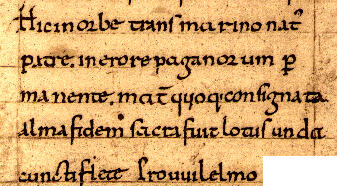MSS.
Florence Libri 2

Hic in orbe transma
rino natus patre in errore paganorum permanente
matrem quoque
consignata alma
fide sacra fuit lu
tus unda: comti.
Clermont-Ferrand 2

Hic in orbe transmarino natus
patre. in errore paganorum per
manente. matre quoque consignata
alma fidem sacra fuit lotus unda
Cuncti flete pro uuillelmo
EDITIONS
Lair
Hac in urbe, transmarino natus
patre,
In errore paganorum permanente,
Matre quoque consignata alma fide,
Sacra fuit lotus unda.
Cuncti flete...
Lauer
Hic in orbe transmarino natus patre
in errore paganorum permanente,
matre quoque consignata alma fide,
sacra fuit lotus unda.
Cuncti flete...
Becker
Hic, in orbe transmarino natus patre
in errore paganorum permanente,
matre quoque consignata alma fide,
sacra fuit lotus unda.
Cuncti flete pro Willelmo innocente interfecto.
Translations
Becker
Dieser, im überseeischen Bereich geboren von einem
Vater, der im Irrtum der Heiden verharrte, und einer
Mutter, die mit dem segenbringenden Glauben geweiht
war, wurde mit dem heiligen Wasser getauft.
Van Houts
Born overseas from a father who stuck to the pagan
error
and from a mother who was devoted to the sweet
religion,
he [William] was blessed with the holy chrism.
Shed tears for William
who died innocently
Helmerichs
This man, born in an overseas city to a father
remaining in the error of the pagans,
but to a mother dedicated to the nourishing faith,
was washed by the sacred water.
All weep for innocent, slain William.
COMMENTARIES
Becker
Lairs Konjektur hac in urbe würde
voraussetzen, daß unser Planctus bei der Beisetzung
gesungen wird, sie zerstört die gewollte Anapher
Hic-Hic-Idem (II. IV. V); hic nimmt den Namen
Wilhelms aus dem Refrain auf und ist dehalb
unentberlich. (“Der Planctus,” p. 197.)
Steenstrup
See the extensive commentary on this verse and the
following in Johannes
Steenstrup, “Dissertation sur la Complainte de
Guillaume Longue-Épée et les critiques dont elle a
été l'objet,” in Étude sur la vie et la mort de
Guillaume Longue-épée, duc de Normandie, by Jules
Lair (Paris: Picard, 1893), 71-77.